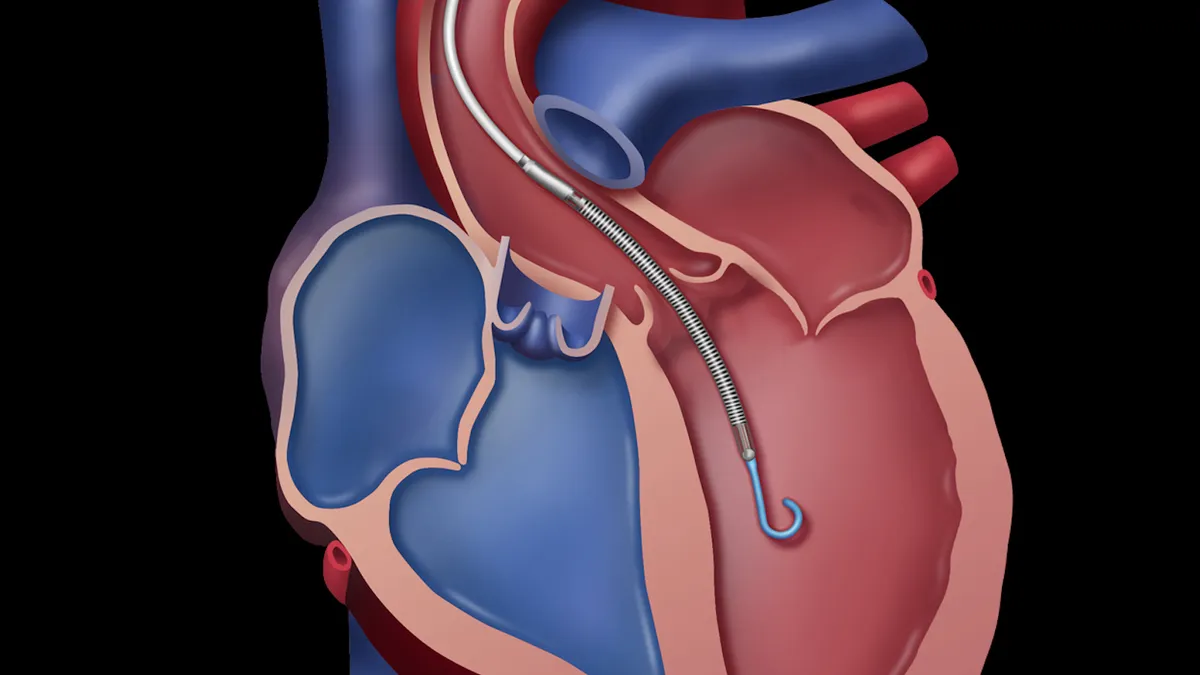Dive Brief:
- The number of new U.S. sites using Abiomed devices last quarter fell by more than 50% versus the year prior, the heart pump maker reported Thursday. The company opened 62 new U.S. sites, down from 135 a year before.
- Still, investors applauded the overall results and strategy and sent shares up 10%. Outside the U.S., Abiomed highlighted business expansion in Japan, which generated $9.6 million in revenue during the second quarter of fiscal year 2020, as well as 27% growth in European revenue, thanks in part to rising patient utilization in Germany.
- Abiomed execs told investors to expect a further slowdown in the number of new U.S. center introductions during the second half of the year as it doubles down on persuading clinicians of product benefits and training "a deeper bench of physicians" to specialize in high-risk percutaneous coronary intervention procedures.
Dive Insight:
Abiomed maintained its guidance for 15% to 20% revenue growth for the year, but said hitting the bottom of that range is more likely. That target was set last quarter, lowered from a previous range of 17% to 23% amid sequentially declining sales of its Impella RP device for patients with right heart failure.
The under-penetrated protected PCI market is a double-edged sword for Abiomed, executives said Thursday, as it represents significant opportunity but also puts the onus on the company to convince doctors of benefits and educate them on how to perform procedures.
Moving forward, Abiomed will have to boost acceptance of its devices for high-risk PCI procedures, executives said, hopefully mimicking the uptick in transcatheter aortic valve replacement programs in hospitals.
Wall Street has been concerned about slowed growth at the medtech since February, when FDA informed healthcare providers that survival among post-approval study subjects for Impella RP proved significantly lower than findings from the premarket trial.
Since then, FDA has sent a follow-up letter saying the benefits of the technology outweigh risks in "carefully selected patients." And last week, the company hoped to put remaining doubts to rest with the presentation of real-world outcomes demonstrating recipients of the right-heart pump achieved similar survival to participants in the pre-approval trial.
About a month earlier at the Transcatheter Cardiovascular Therapeutics symposium, Abiomed presented an interim analysis of 898 patients in its PROTECT III post-approval study which showed Impella-supported protected PCI lowered the rate of major adverse cardiac and cerebrovascular events in high-risk PCI patients.
CEO Michael Minogue said Thursday results from PROTECT III and other recent studies represent the best clinical outcomes the company has demonstrated across all indications. "We will regain our momentum," he said.
Post-TCT, analysts expressed confidence in Abiomed's long-term prospects, but acknowledged challenges in getting physicians on board with the company's devices.
"On one side is an expanding body of evidence supporting Impella in large and growing markets, no competition, and a company redoubling its efforts," Jefferies analysts wrote in a note to investors Sept. 30. "On the other side are persistent questions on the data and a next group of users that has yet to be convinced the value of Impella outweighs the effort to use it."
"We continue to believe that penetration remains low at less than 15% and that the long-term thesis around hemodynamic support remains intact," the William Blair team wrote in a Sept. 30 note.
Overall revenues during the second quarter of fiscal year 2020 were $205 million, representing a 13% rise over last year and just missing analysts' expectations. The company also touted a 20% rise in operating income. Abiomed also said Thursday it's begun a limited market release of its Impella 5.5 device, an up to 14-day heart pump for cardiogenic shock which gained FDA approval during the quarter.
Abiomed's stock also rose last week in apparent reaction to Abbott pushing back the completion date for a study comparing its HeartMate PHP catheter to Abiomed's Impella pumps for use in high-risk PCI, as identified by Seeking Alpha.












